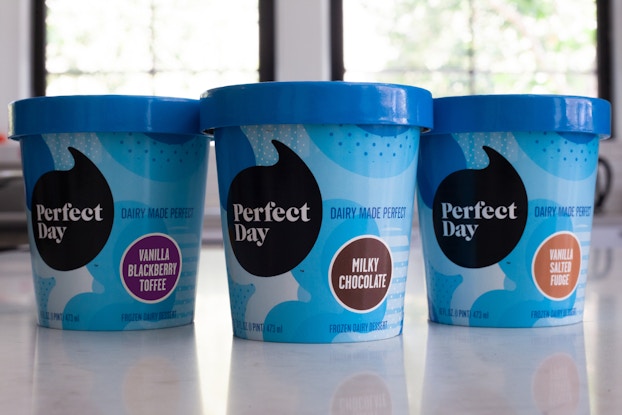
In July, Emeryville, California-based food technology startup Perfect Day launched a limited edition, animal-free dairy ice cream, selling a three-flavor bundle on its website for $60 plus shipping and handling. The offer proved popular. The 1,000 pints of cow-free Milky Chocolate, Vanilla Salted Fudge and Vanilla Blackberry Toffee ice cream sold out in only a few weeks.
Perfect Day, which was founded in 2016 by vegan scientists Ryan Pandya and Perumi Gandhi, has created a way of using the age-old process of fermentation to convert sugar into whey and casein, the two main protein ingredients in cow's milk. This process, along with some added fat, sugar and other ingredients, produces its $20-per-pint ice cream. It’s what the startup impressed upon big food producers to demonstrate how microflora protein can be used to produce animal-free ingredients for milk, dairy products, cheese and ice cream.
Perfect Day’s microflora protein, its secret sauce and what it calls “flora” for shorthand, is made through the same fermentation techniques used for nearly 50 years to produce many common food ingredients like vitamins, probiotics and natural flavors, Ryan Pandya, co-founder and CEO of the cow-free dairy startup, told CO—.
The process is roughly analogous to the way much talked about Impossible Foods makes meatless burgers like Burger King’s very popular Impossible Whopper. Microbes are given genetic instructions to produce the dairy proteins. These organisms then start churning out large quantities of proteins, which are isolated and added to various recipes to make ice cream and other dairy products.
“Being flora-based means that Perfect Day’s protein is vegan, lactose-free and hormone-free because no animals are used,” Pandya said. “And unlike proteins which are made from soy, nuts or other plants, Perfect Day’s protein provides the same nutritional benefits and taste and texture as cow’s milk.”
Because flora-based dairy protein has the same functionality that companies have come to expect from dairy protein, it’s easy for brands to improve their sustainability or reach a wider audience by simply swapping the old for the new.Ryan Pandya, co-founder and CEO, Perfect Day
Now trending
Perfect Day is capitalizing on the food technology movement by placing an emphasis on sustainability — one of the top trends fueling new business ideas. Read more trends here.
The B2B push
In further explaining microflora, Pandya said that it can be also harnessed to produce high-demand food products (what he calls “flora foods”) with much lower environmental impact based on land and water use, greenhouse gas emissions and energy consumption.
“Because the fundamental biology is analogous to protein production in animals, but without the wasteful step of producing live animals and their associated pollutants, flora enable doing more with less,” argues the vegan scientist who had a career in biomedicine before starting Perfect Day with partner Perumal Gandhi.
Sustainability is part of Perfect Day’s big pitch. Livestock agriculture uses lots of water and land resources, and produces significant amounts of greenhouse gases. Therefore, animal-free is better for you and better for the earth, the company says.
Perfect Day has raised $60 million from investors so far.
Interestingly, it doesn’t plan to create its own branded products like the limited-edition ice cream. Rather, its business model is solidly business-to-business: Perfect Day wants to sell its cultured whey and other animal-free proteins to food producers who will then make value-added dairy products, like cow-free milk, cheese and ice cream.
The company recently secured a contract with agribusiness and food giant Archer Daniels Midland Company (ADM) and is in talks with a number of branded food and dairy companies about opportunities.
“To deliver on our mission [of producing animal-free dairy] and drive the greatest positive impact on the global food supply, we realized we would be most effective by partnering with food and dairy companies to bring a whole variety of new animal-free dairy products to market, not just one new brand,” Pandya said, explaining the partnership with ADM and the food and dairy companies it’s currently negotiating deals with. “Because flora-based dairy protein has the same functionality that companies have come to expect from dairy protein, it’s easy for brands to improve their sustainability or reach a wider audience by simply swapping the old for the new,” he said, in describing the opportunity.

Disrupting big dairy
Elsie the Cow has a whole lot of competition these days. Plant- and nut-based milk and dairy products like soy, oat, coconut, hemp, almond, cashew and walnut have gone from zero to 15% of the total U.S. milk and dairy market seemingly overnight, topping $1.6 billion in annual sales as of June 2018, according to Nielsen retail sales data.
Plants and nuts are clearly disrupting dairy cows. Per capita consumption of fluid milk fell for the ninth straight year in the U.S. in 2018 and is a whopping 40% below the levels of the mid-1970s, U.S. Department of Agriculture data show.
The Dairy Farmers of America (DFA), which represents 30% of all U.S. dairy farmers, said earlier this year that sales of traditional milk decreased by $1.1 billion in 2018. Last year’s net sales totaled $13.6 billion, compared to $14.7 billion in 2017. The DFA attributes most of decrease in milk sales to low dairy prices but also acknowledges that plant- and nut-based milk and dairy products are taking a bite out of conventional dairy.
Now comes Perfect Day, which is focusing on disrupting not only traditional animal-based dairy but also conventional plant-based dairy, with milk and dairy products produced in a laboratory using synthetic biology.
The company isn’t alone either. Three similar startups, Clara Foods, New Culture and Motif Foodworks also have their sights set on reinventing dairy in the laboratory.
The jury remains out on whether or not consumers will fully-embrace lab-based dairy, but if Perfect Day’s successful limited-edition ice cream trial is any indication of potential success, the future could be bright.
Taste is a key attribute for consumers when it comes to milk and dairy products, according to research studies. It’s been one of the limiting factors cited by consumers when it comes to traditional plant-based milks and dairy products.
Therefore, if Perfect Day can crack the taste-and-texture code like Pandya says it has and make a product without the cow that tastes as good as those containing cow's milk, the next iteration of dairy might by animal-free.
“Just like cows eat plants and make milk, it turns out flora can eat plants and make milk. And that’s all we’ve done,” Pandya said. “Our protein makes dairy products that have the texture and taste of traditional dairy but without the cow.”
CO— aims to bring you inspiration from leading respected experts. However, before making any business decision, you should consult a professional who can advise you based on your individual situation.
CO—is committed to helping you start, run and grow your small business. Learn more about the benefits of small business membership in the U.S. Chamber of Commerce, here.

What can membership do for your business?
Gain tools to stay informed, competitive, and connected by becoming a U.S. Chamber of Commerce member. Membership gives you direct access to expert policy insights, economic updates, and exclusive resources designed to help your business thrive. From behind-the-scenes analysis from D.C. to exclusive discounts and expert support, U.S. Chamber membership helps you navigate change and seize new opportunities.







